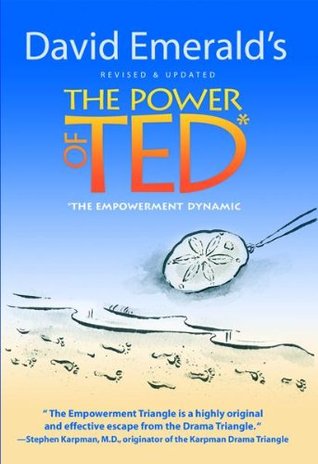More on this book
Community
Kindle Notes & Highlights
“Victims may be defensive, submissive, over-accommodating to others, passive-aggressive in conflict, dependent on others for self-worth, overly sensitive, even manipulative. They’re often angry, resentful, and envious, feeling unworthy or ashamed about their circumstances.
When human beings are afraid, they’re programmed to react.
All you see in life are problems. And these problems, whether they are people or circumstances, become your Persecutors, the perpetrators of your misery.
the Persecutor gets the blame for causing the Victim’s feelings of grief, despair, and hopelessness.”
Victims often react to situations in ways that make them Persecutors in the eyes of others. That’s important in the Drama Triangle. Persecutors, like Victims, act out of fear. They may seem fearless, but actually Persecutors are almost always former Victims. They’re mobilized by the fear of becoming a Victim, nursing angry resentments about times when they felt victimized. Persecutors inwardly declare, ‘I’ll never be a Victim again!’ Ultimately, what they fear most is loss of control.”
“So you see, instead of helping or supporting the Victim, the Rescuer just increases the Victim’s sense of powerlessness.
“Persecutors fear loss of control. Rescuers fear loss of purpose. Rescuers need Victims—someone to protect or fix—to bolster their self-esteem. Rescuing gives them a false sense of superiority that covers their fear of being inadequate. Rescuers get to feel good about themselves, as long as they don’t admit that Victims could meet their own needs without them. With Victims to rescue, Rescuers feel justified; they avoid abandonment by being there for others. They foster dependency by becoming indispensable to a Victim’s sense of well-being.”
The anxiety you feel comes from your way of focusing on the problem.
“My own fearful reaction creates the exact result I’m trying so hard to avoid: being abandoned.”
“The focus in the Creator Orientation is on a Vision or an Outcome. You orient your thoughts and actions toward creating what you most want to see or experience in life. Sometimes the vision or outcome may be completely clear to you. At other times it may be vague, only a general idea about where you want to go.”
“When you focus on those things in your life that hold meaning and purpose, your passion just naturally flows.”
Each person I met, and each experience I had while I was dating, helped me get clearer about the kind of relationship I wanted.”
“You’re not a human being seeking a spiritual experience; you’re a spiritual being having a human experience.
When you simply react, it means you are choosing the way of the Victim. If, on the other hand, you stay mindful of current reality and determine how best to respond, you’ve entered The Empowerment Dynamic.”
Someone once said that forgiveness is giving up the hope of ever having a better past.
“Welcome them as teachers that are challenging you to grow. In this way, you transform your situation into an opportunity for action or at least for learning, and the gift of the Challenger is yours.
My challenge to you, my friend, is to stay awake to the choices you make every day and to the relationships you cultivate.”
“Emotions are a measure of how important something is to you, David,”
Each day I awaken to a range of choices that will shape my reality and my life. Some days are better than others. Like the weather outside my window, some mornings bring sun and clarity; others seem dusted with a grey haze.
Where do you see yourself in the story? What kinds of choices are you making? And what is the Baby Step that will make a shift happen in your life, today?


